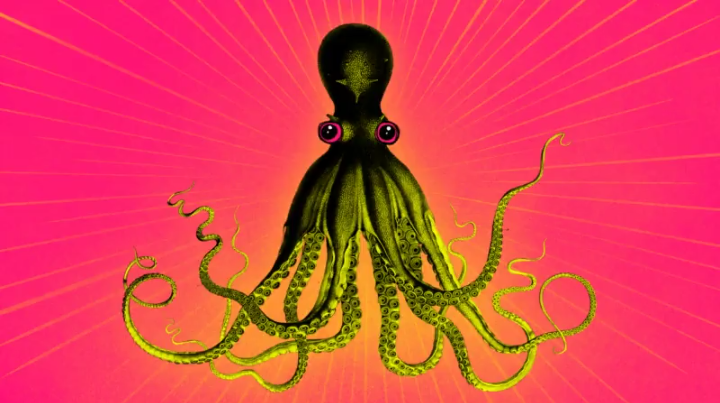A member of the Octopus bimaculoides species
Photo: Tom Kleindinst
The scientists took this to mean that despite our vastly different brains, social behavior is built into the very molecules coded by our DNA, Dölen explained.
“An octopus doesn’t have a cortex, and doesn’t have a reward circuit,” Gül Dölen, assistant professor of neuroscience at Johns Hopkins University, told Gizmodo. “And yet it’s able to respond to MDMA and produce the same effects, in an animal with a totally different brain organization. To me, that means we really need to appreciate that the business end of these things is at the level of the molecule.”
ADVERTISEMENT
You’re probably curious: did the octopuses freak out? The scientists didn’t discuss such behavior in the paper, because it’s hard to quantify without anthropomorphizing the octopuses—Dölen warned me that the following is anecdotal evidence and not scientific observation. But yes, the octopuses acted like they took ecstasy. At first, when they received a little too much MDMA, they breathed erratically and turned white. But on lower doses, one animal “looked like it was doing water ballet,” swimming around with outstretched arms. Another spent part of the time doing flips, and another seemed especially interested in minor sounds and smells.
“This was such an incredible paper, with a completely unexpected and almost unbelievable outcome,” Judit Pugnor, a postdoctoral researcher at the University of Oregon not involved in the study, told Gizmodo. “To think that an animal whose brain evolved completely independently from our own reacts behaviorally in the same way that we do to a drug is absolutely amazing.”
There are limitations to the study, of course. Dölen pointed out that seven octopuses isn’t a large enough sample size to show differences between how males and females react to MDMA. She’d like to further test the changes in behavior, as well as what happens if they block the serotonin transmitter before giving the MDMA. Such a test would convince Dölen that she was really seeing the affects of MDMA on serotonin transporters. Pugnor also wanted to test whether the drug would have different effects on octopuses of varying ages, or whether an octopus’s upbringing changed its sociality.
ADVERTISEMENT
It’s clear that psychoactive drugs like MDMA, LSD, and magic mushrooms are going through a scientific renaissance—they’re being studied as potential treatments for depression and PTSD—and as their stigma decreases, scientists are more open to studying them, and more research funding becomes available. This could be important for our understanding of animal and human brains.
“People are beginning to recognize that these drugs are powerful tools for understanding how the brain evolved,” Dölen told Gizmodo. “They’re such strong activators of these behaviors. It’s not subtle.”
Hi! I am a robot. I just upvoted you! I found similar content that readers might be interested in:
https://gizmodo.com/scientists-gave-mdma-to-octopuses-and-what-happened-was-1829191638